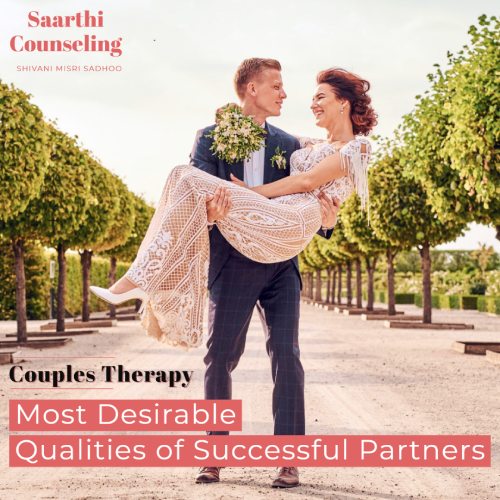According to India’s Top Marriage Counselor Shivani Sadhoo
Couples Therapist Shivani Sadhoo says all these years as a psychologist and marriage counselor, she has carefully observed the attitudes and behaviors of people who consistently succeeded in their long-term intimate relationships.
Several of those qualities are evident in a new relationship but are mostly much less vital in the long run. This blog from India’s leading marriage counsellor shares a few gender-free, common examples.
Shivani Sadhoo opines that although these are all essential requirements most people look for in new relationships, they are, in all truth, driven by the personal qualities that lie beneath them, and those characteristics are not always sustainable over time.
But there are a few personal qualities that are guaranteed to sustain and deepen love and commitment amongst the couple over time that is mostly not as evident early in new relationships. They crop up over time and are driven by the core beliefs and personal philosophies of those who are determined to lead and live a meaningful life in whatever endeavours they participate in. These are some of the qualities.
Humility
Quite a wise person once said that the roots of humility and humiliation are the same: being on your knees. If you are being pushed into that position, you will feel humiliated. It is so much simpler to comfortably stay humble, and deeply grateful for the capacity to be in amazement and wonderment of the experiences that keep everyone worshipping the blessings of life.
Fairness
Agreements and the rules that define those are mutually opted by both individuals in an intimate relationship. Fairness is the commitment to either live by those sacred alliances or to go for renegotiation if they no longer assist the relationship’s ideals and principles. When there is mutual fairness, score-keeping never exists.
Courage
It is most scary to take the risks required to challenge oneself and others in a long-term relationship when the outcomes might be difficult to bear. Yet, your thoughts, beliefs, and actions withheld to maintain a questionable harmony mostly backfire when those pent-up behaviors erupt. When a couple supports one another to stay present and real, they can better face the truth of what is.
Translucence
Honesty, authenticity, and transparency are the foundations of trust. They predict whether your partners will be who they say they are or not. Gaslighting and ghosting never exist in these relationships. The people in these partnerships make mutual decisions formed based on reality rather than assumptions formed in confusion and conflict.
Resilience
There will always be hurdles in every relationship, both from within and without, and certain couples have more than their share of losses. Yet, remaining broken and buried by those legitimate heartbreaks probably steals time and energy from recuperation. Though a few people are simply born with more capacity to rebound, resilience can also be learned. The past is for lessons, not for rehashing or reasons to helplessly fall down again in defeat. The present is for debriefing what went on, what was learned, and what could be done differently in the coming time.
Interested and Interesting
Long-term relationships quite often fall prey to the same-old predictable interactions. Though it is most comforting and more secure to know what your spouse might or might not do, it is never as compelling as new thoughts and personal transformations. Couples who balance commitment to their relationship with constant personal transformation are the most probably to keep each other engaged.
Accountability
No relationship is able to survive an unequal responsibility for the things that go wrong. Nor can it tolerate promises for transformation that never materialize. Accountability will only serve its purpose if behavior alteration follows the recognition of contribution. Certain behaviors are much more difficult to change and attachments could get in the way, but being aware, open, and honest about one’s own frailties goes a long way when repairing is mandatory.
Humor
Seeing the lightness in things while they get too heavy. Relieving tension in self and others. Laughing at yourself. Making others feel good. Shaking off your own sadness. These are critical reasons for humor being a wonderful quality that mostly helps a situation heal. But it is also true that humor can also be used as a tool for wounding. When humor is used as sarcasm, mocking, or teasing, or an effort to get out of accountability, it is not healthy relationship conduct.
Chivalry
Almost every relationship is, for the most part, transactional. You all strive to keep your commitments but, certainly, reasonably expect reciprocity when you need it in return. But the fairness that forces those agreements sometimes should be upended by an unexpected crisis that needs giving beyond the fairness that is generally present. Chivalry is an act of selfless motive that comes from a different part of the self. It is a non-conflicted work of giving without any expectation of getting.
Nurturing
You are always all the ages you have ever been, and there are times when the child in you desperately requires a safe haven to feel, to cry, to complain, and even to yell powerlessly. The nurturing that is needed for any intimate relationship to thrive is the simple comfort of a pseudo-parent-child interaction sans judgment. Being able to crawl into the haven of loving arms not just can heal the moment but also heal the trauma that might have driven it.
Ease with self
Those lucky souls who know who they are, what they can give, what they require in return, and who live life equivalent to what they expect of others are individuals who have suffered their losses and rejoiced in their joys. They have found methods to integrate the completeness of their life experiences in a composite of quiet confidence. They are at ease with believing what they presently know and are still open to altering their perspective as new experiences enter their lives.



